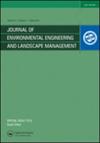ROLE OF PLANT SECONDARY METABOLITES IN COMBATING PEST INDUCED STRESS IN BRINJAL (SOLANUM MELONGENA L.)
IF 1.1
4区 环境科学与生态学
Q4 ENVIRONMENTAL SCIENCES
Journal of Environmental Engineering and Landscape Management
Pub Date : 2021-12-14
DOI:10.3846/jeelm.2021.14432
引用次数: 0
Abstract
Brinjal or eggplant (Solanum melongena L.) is known as a vegetable of diet because it contains high moisture and low calorific value. It is also a good source of antioxidants and phytonutrients. Brinjal is widely grown in the South and South-East Asian countries and is the second most important vegetable in India. It belongs to the Solanaceae family. Shoot and fruit borer (Leucinodes orbonalis) pest of brinjal is the most widespread one and it has the ability to affect any of the developmental stages of brinjal. Plants and their insect herbivores have had a long and intimate evolutionary association that has resulted in many complex interactions mediated by specialized plant metabolites like phenolics, alkaloids, terpenoids, cyanogenic glycosides etc. Frequent and excessive use of insecticides has become a common practice now which only increases the probability of resistance development and resurgence of pest. Hence to develop an effective approach to combat this pest understanding of its feeding mechanism and chemistry of its interaction with the fruit is necessary. The importance of the secondary metabolites in the field of chemical biology and in pest management is discussed in this study.植物次生代谢产物在茄子抗病虫害胁迫中的作用
茄子(Solanum melongena L.)是一种众所周知的日常蔬菜,因为它含有高水分和低热值。它也是抗氧化剂和植物营养素的良好来源。Brinjal在南亚和东南亚国家广泛种植,是印度第二重要的蔬菜。它属于茄科。茄子的茎果螟(Leucinodes orbenistor)是最普遍的害虫,它能够影响茄子的任何发育阶段。植物及其食草动物有着长期而密切的进化联系,导致了许多由特殊植物代谢产物介导的复杂相互作用,如酚类、生物碱、萜类、发蓝糖苷等。频繁和过度使用杀虫剂已经成为一种普遍的做法,这只会增加害虫抗性发展和死灰复燃的可能性。因此,为了开发一种有效的方法来对抗这种害虫,有必要了解它的取食机制及其与果实相互作用的化学性质。本研究讨论了次生代谢产物在化学生物学和害虫管理领域的重要性。
本文章由计算机程序翻译,如有差异,请以英文原文为准。
求助全文
约1分钟内获得全文
求助全文
来源期刊
CiteScore
1.90
自引率
7.70%
发文量
41
审稿时长
>12 weeks
期刊介绍:
The Journal of Environmental Engineering and Landscape Management publishes original research about the environment with emphasis on sustainability.

 求助内容:
求助内容: 应助结果提醒方式:
应助结果提醒方式:


